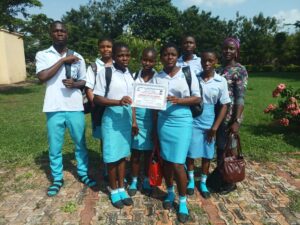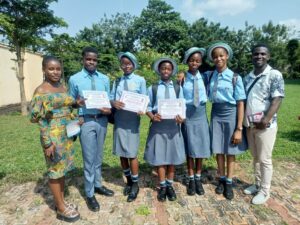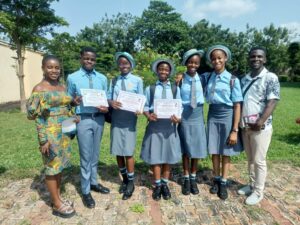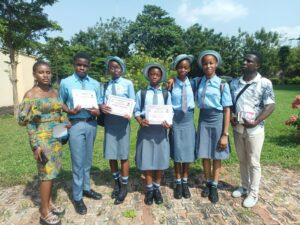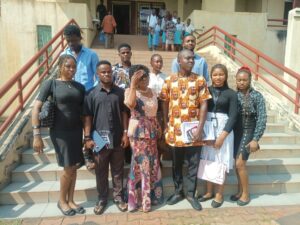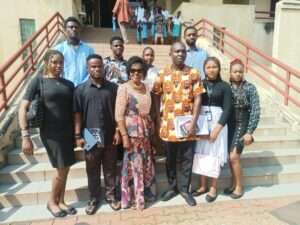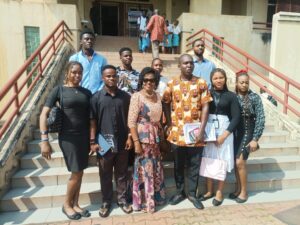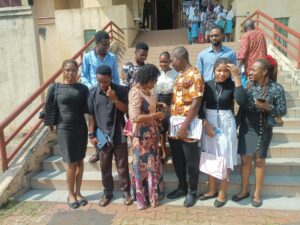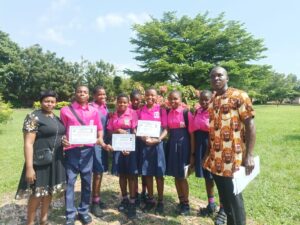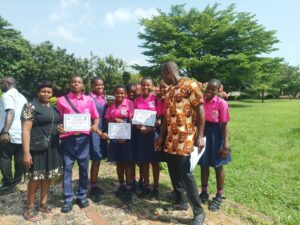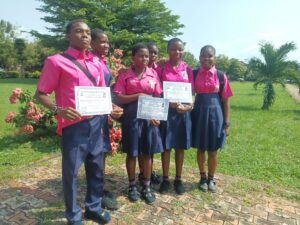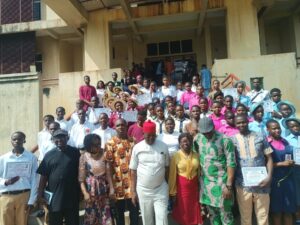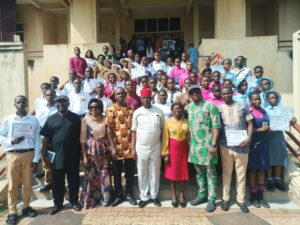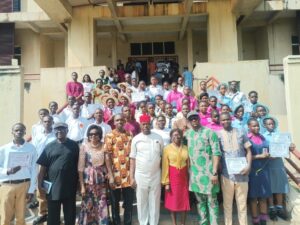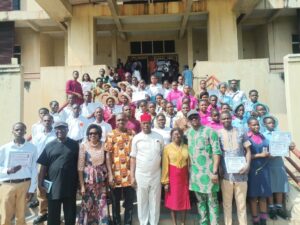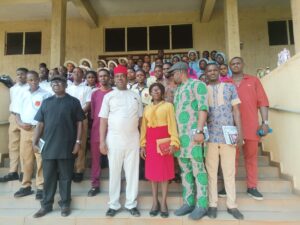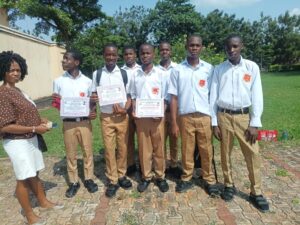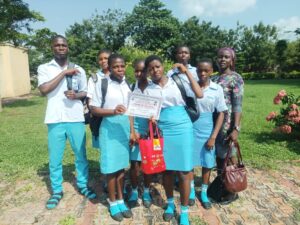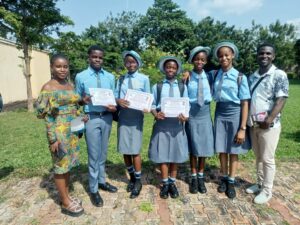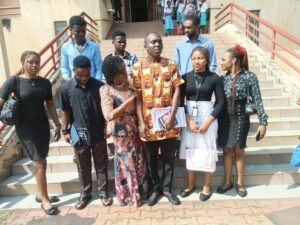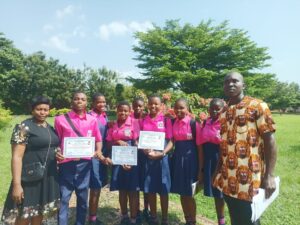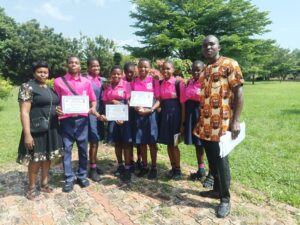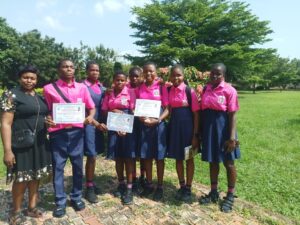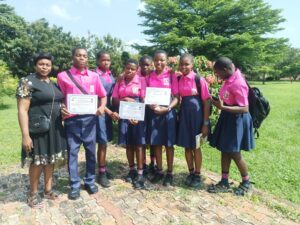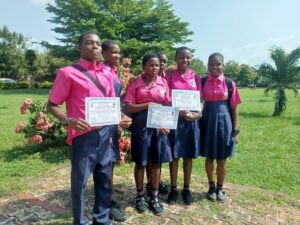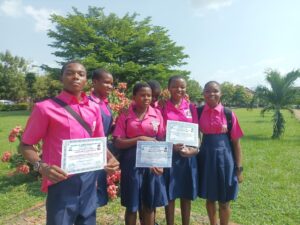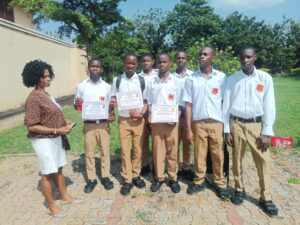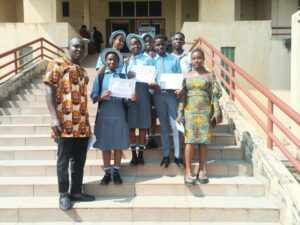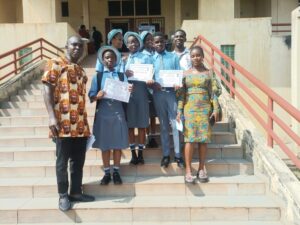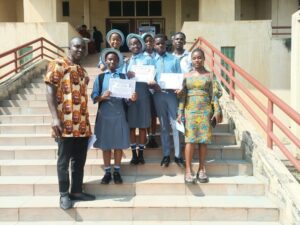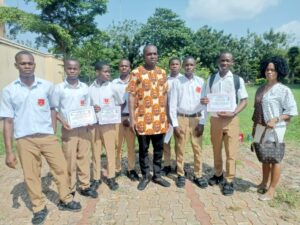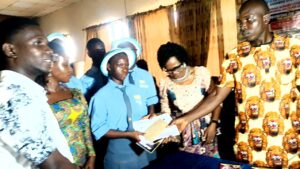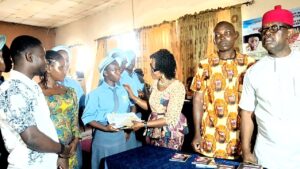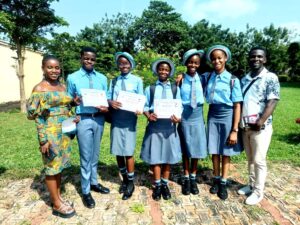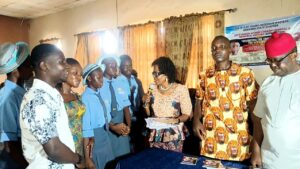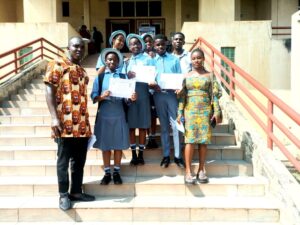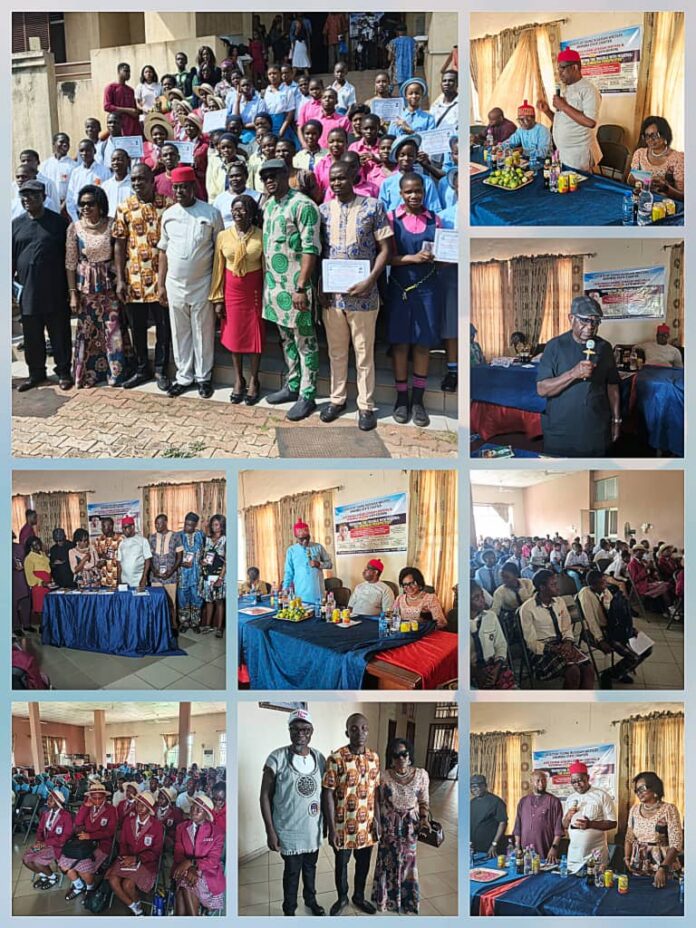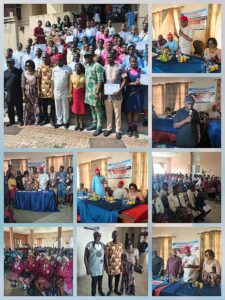By Joseph Ude, Awka
All roads led to the Anambra State Central E-Library, Awka, on Friday, as writers, students, scholars, dignitaries, cultural leaders, and literary enthusiasts converged for the 2025 Chinua Achebe Literary Festival and Memorial Lecture, a gathering that once again reaffirmed Anambra’s place as the literary heartbeat of Africa and the spiritual homeland of modern African literature.
Organised by the Society of Young Nigerian Writers (Anambra State Chapter), the Festival, now in its tenth edition, lived up to its reputation as one of the most consistent literary events on the continent. The occasion brought together a rich blend of intellectuals and lovers of literature to honour the life and legacies of the late Prof. Chinua Achebe, whose works continue to define African narrative identity and inspire generations of readers, writers, and cultural thinkers across the world.
Declaring the event open, the Chairman of the Occasion and immediate-past National Vice President of Ohaneze Ndi Igbo, Chief Damian Okeke-Ogene, commended the organisers for sustaining the Festival for ten consecutive years and reaffirmed Achebe’s position as one of Africa’s most influential voices whose ideas and true identity as Onye Igbo remain eternally relevant.
He described the event as an evidence of the power of vision and commitment over person gains, noting that any society that celebrates literature, truth, and cultural memory paves the way for its own enlightenment.
According to him, Achebe’s writings remain a moral compass for contemporary Nigeria, especially in an era where leadership, values, and national identity are constantly being tested. He further urged the government, private sector, and cultural institutions to support initiatives like the Festival, while praising the young writers for carrying Achebe’s torch with dignity, creativity, and consistency.
Also speaking, Special Guest at the event and former Governor of Anambra State, Mr. Peter Obi, emphasized the timeliness of the Festival and the need for sustained literary consciousness in Nigeria.
Mr. Peter Obi, who was represented by the Deputy Vice-Chancellor (Academics) of Paul University and first female Professor of Mass Communication in Sub-Saharan Africa, Prof. Chinyere Stella Okunna, lauded the Society of Young Nigerian Writers for organising the event, and highlighted the urgent need to revive the dwindling reading culture among Nigerian youths, which he partly attributed to the pervasive distractions of modern technology.
He also harped on the need for government, private individuals, and policymakers to prioritise and invest more in education, literary platforms, libraries, and initiatives that support the growth of young creative talents. Obi further called for a collective effort to ensure that Achebe’s ideals of truth, justice, integrity, and responsible leadership continue to guide Nigeria’s social and political development.
On his own part, the State Commissioner for Information, Dr. Law Mefor, lauded Achebe as one of the finest minds Africa has ever produced, as well as as an enduring institution whose intellectual legacy remains unmatched in African literature and deeply woven into the identity of the Igbo people.
Highlighting and extolling the indelible legacies of Achebe, he also praised Governor Chukwuma Charles Soludo for supporting the literary community, and reaffirmed the administration’s commitment to strengthening education, culture and intellectual heritage. Announcing the Governor’s plan to build 30 new schools, the Commissioner emphasized the need for continuous engagement with Achebe’s works as tools for civic renewal, while acknowledging the Festival as a cultural asset that reflects the creative strength of the State.
In his goodwill message, the Royal Father of the Day and Traditional Ruler of Obosi, Igwe Chidubem Iweka (Eze Iweka III), who is also the Chairman of the Anambra State Traditional Rulers Council, praised Achebe as both a global cultural icon and a timeless oracle of African storytelling.
Represented by Chief Ikenna Jibike, Liaison Officer to Exe na Ndị Ichie Obosi on Town Union and Chieftaincy Affairs, Igwe Iweka, who himself is a literary enthusiast and award-winning writer, commended the organisers for preserving Achebe’s legacy through sustained literary engagement.
He described the Festival as a cultural duty that must be protected, while urging young people to emulate Achebe’s profound dedication to truth, identity, and excellence in their creative pursuits.
Delivering a keynote lecture on the theme “Revisiting the Trouble with Nigeria: The Achebean Perspective,” the Keynote Speaker and Anambra State Commissioner for Education, Prof. Ngozi Chuma-Udeh, examined Nigeria’s developmental challenges through Achebe’s ideological lens.
Prof. Chuma-Udeh, who delivered the lecture through Dr. Bryan Udeh, reiterated Achebe’s position that Nigeria’s biggest problem remains a failure of leadership and the absence of a moral foundation in governance.
She noted that Achebe’s warnings decades ago are still alarmingly relevant today, especially in the face of declining values, insecurity, institutional decay, and weakened civic responsibility.
According to her, the Achebean worldview demands accountability, ethical leadership, cultural consciousness, and a people-oriented political system. She called on writers, intellectuals, educators, and policymakers to internalise Achebe’s message and translate it into measurable action for nation-building.
In their separate goodwill messages, former Director of the Anambra State Library Board, Dr. Nkechi Udeze, and the Press Secretary to the Governor, Mr. Christian Aburime who was represented by journalist Mr. Ejike Abana, commended the organisers for sustaining the Festival. They described Achebe’s legacy as a cultural mandate that must be upheld, harping on the need to increase support for literary development in the state.
Earlier in his address of welcome, the Host and State Coordinator of the Society of Young Nigerian Writers (Anambra State Chapter), Izunna Okafor, traced the history of the event from 2016 to date, noting that it was established to celebrate Achebe’s life, works, and enduring influence, while also serving as a platform for nurturing emerging writers and stimulating reading culture among young people.
According to him, the event usually holds on November 16, but this year’s edition was held earlier (on 14th November) because the usual date which is Achebe’s birthdate, November 16 fell on a Sunday, a day he felt might hinder attendance.
He appreciated dignitaries, schools, institutions, cultural legends, and literary icons for identifying with the Festival, stressing that Achebe represents a timeless flame that must be kept alive through conscious intellectual engagement.
Okafor, an award-winning author and journalist, further highlighted the rich African symbolism of the annual international collection published in honour of Achebe — the Chinua Achebe Poetry/Essay Anthology, the titles of which intentionally echo Achebe’s books as a way of immortalising his influence.
He explained that this year’s edition of the international anthology, titled “Achebe — Arrow of Wisdom,” which was unveiled at the event, marks the tenth edition of the series and features entries from writers across the world. Thanking Soludo for renaming the Anambra Airport after Achebe, Okafor further used the platform to appeal to the State Government and private individuals to take up sponsorship of the annual event, which he has privately funded for ten years, and also called for the establishment of a Chinua Achebe International Writers Residency in Anambra State to further honour the literary icon, as it is unimaginable that no single writers residency exists anywhere in the entire southeastern Nigeria let alone in Anambra where Achebe came from.
While expressing gratitude to partners like the Naira Rice Company, and the Anambra Broadcasting Service, Okafor reiterated the need for government or private individuals to support the Festival, empower young writers, endow more literary prizes, and provide the association with a mobility vehicle to enhance its literary activities.
The event, attended by key figures including Commissioner for Culture, Entertainment and Tourism, Mr. Don Onyenji; Managing Director of ABS, Mr. Chris Molokwu; literary icon Isidore Emeka Uzoatu; school delegations; and other invited guests, also featured a rich lineup of literary activities. These included spoken word performances, drama, cultural exhibitions, special readings, and book presentations inspired by Achebe’s works.
Among major highlight at the event was the announcement and recognition of authors of the ten outstanding poems and essays featured in the 2025 Chinua Achebe Poetry/Essay Anthology. The occasion also featured the announcement of Ismail Bala (author of “After 1966”) and Adeleke Yinka Ogunfeyimi (author of “He Who Brings Kola Brings Life: Achebe the Literary Biochemist”) as the winners of the Best Poet and Best Essayist awards in the poetry and essay categories of the anthology for this year, as was announced by the Head Judge of the competition and award-winning poet, Mr. James Eze.
The winners of the 2025 Chinua Achebe Essay Writing Competition for secondary schools were also announced and celebrated, receiving prizes, certificates, and recognition for their outstanding creative submissions.
In the competition, Okemefuna Mmesoma Blessing from the St. John of God Secondary School, Awka won the 5th prize; Ihechereobi Chetachukwu Favour from Kenneth Dike Memorial Secondary, Awka; Chidera Agbo from Igwebuike Grammar School, Awka, won the 3rd prize; Oluebeube Igwe from King’s International College, Amawbia, won the 2nd prize; while Chidimma Okafor from Differential Secondary Okpuno emerged the champion in the competition.
Born on November 16, 1930, Achebe rose to global prominence with Things Fall Apart and went on to redefine African storytelling before his death on March 21, 2013. Twelve years after his passing, his wisdom, courage, and artistic brilliance continue to illuminate African identity.
The ceremony ended with photo sessions, networking, artistic engagements, and warm exchanges among writers, guests, and dignitaries. The Festival was largely described as a cultural treasure that has lifted Anambra’s literary reputation and gifted Africa a long-standing model of sustainable literary celebration. With its tenth edition now successfully hosted, the event unarguably continues to inspire nations, shape generations, and preserve enduring legacies.
More photos from the event:










































































































